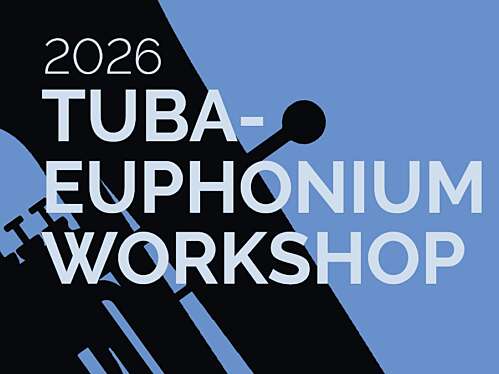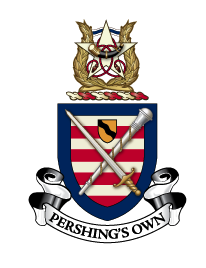
Friday Events
All Friday daytime events will take place at Brucker Hall.
SSG Brandon Benson
TBD
Eighth Army Band
Brandenburg Concerto No. 3 J.S. Bach (arr. Neal Corwell)
Finale
Four Seasons Miho Hazama
III. Fall- Dance
IV. Winter- Firelight
Mephisto Waltz No. 4 , S.216b Franz Liszt (arr. Jacob Kittleson)
SrA Andrew Berry
Sonata BWV 1020 J.S. Bach (Trans. Andrew Berry)
The Navy Fleet Band Euphonium Quartet
The Navy Fleet Band Euphonium Quartet represents the musical excellence and mission of the United States Navy’s nine Fleet Bands, which serve as musical ambassadors across the nation and around the world. Through ceremonial support, community engagement, educational outreach, and international goodwill performances, Navy Fleet Bands help connect Sailors with the public through the universal language of music while reflecting the Navy’s core values of honor, courage, and commitment.
Today’s quartet features MU2 Bryce Bowlin and MU3 John Ingram from Navy Band Great Lakes in Great Lakes, IL, MU3 Brandon Hawkins from Navy Band Northwest in Silverdale, WA, and MU2 Geoff Durbin from Navy Band Southeast in Jacksonville, FL. Though stationed across different Fleet Bands, these musicians have come together to showcase the versatility, professionalism, and collaborative spirit that define Navy Music’s support to the Navy and the Nation.
Program TBD
Neo Yamada, tuba
Adagio & Allegro Op. 70/Robert A. Schumann
Three Miniatures/Anthony Plog
Three Tangos/Astor P. Piazzolla
Nathanael Kumar, euphonium
Norwegian Serenade/Nathanael Kumar
Violin Concerto, I. Allegro moderato/Jean Sibelius arr. Nathanael Kumar
Set-Off (2022)/Wan-Yun Liang (b. 1976)
All the Skies Above (2017)/Nicole Piunno (b. 1985)
Lava Cake (2024)/Jakobe Henry (b. 1997)
Appalachian Carol (1992)/James Canter (b. 1952)
Dr. Jasmine "Jazzie" Pigott, tuba and Jermaine Fryer, euphonium
Two-Part Inventions 5 and 6 from Fifteen Two-Part Inventions - J. S. Bach, transcribed by Alan Hawkins
Dido's Lament - Henry Purcell transcribed by Jasmine Pigott
In Daddy's Shoes - Jasmine Pigott
Three Grooves for Two Tubas - Tom Holtz
Devil's Waltz - Steven Verhelst
Melodious Etude #37 for tuba-euphonium quartet - Marco Bordogni, arr. Ran Whitley
Birdland - Joe Zawinul and Wayne Shorter, arr. Adrien Re
Soloists: Adrien Re and Kenny Naylor
Animal Spirits - Jack Stratton and Theo Katzman, arr. Caleb Langley
Soloist: Gabe Willis
Sunday Morning for tuba-euphonium ensemble - Adrien Re
World premiere
Soloists: Caleb Langley and Caleb Morris
El Gigante de Metal/Ferrer Ferran
Dreams of the Little Tuba/Rafael Castillo
Ritual Firedance from The Bewitched Love by Manuel de Falla/Arr. Thomas Ruedi
Seven popular spanish songs by Manuel de Falla
-I. El paño moruno
-II. Seguidilla murciana
-III. Asturiana
-IV. Jota
-V. Nana
-VI. Canción
-VII. Polo
Malagueña (Spanish Dances) by Pablo de Sarasate/Arr. Miguel Victorio
Gypsy airs by Pablo de Sarasate/Arr. Thomas Ruedi
Euphoniums: Ben Thompson, Grant Johnson, Braden Shaw, Sullivan Tucker
Tuba: Ian Graves, Travis Snyder, Eli Kidd, Seth Dossa
Back to the Future (1985)/Alan Silvestri (b.1950) Arr. Jordan Moore
Shindig (In Them Thar Hills)/Jim Self (1943-2025)
Tango Divertido/Ben Horne (b. 1995)
My Old Kentucky Home (1853)/Stephen Foster (1826-1864)Arr. Matt Hightower
“What do you Mean, Musicianship?”
Selections from West Side Story / Leonard Bernstein, arr. Irving Ray
I. Scherzo
II. Mambo
III. Cha-Cha
IV. Maria
V. Cool Fugue
VI. Somewhere
VII. I Have a Love
SFC Nick Starr, piano; SSG Henry Eichman, drum set; SSG Will Kan, auxiliary percussion; SSG Pat Spallinger, double bass
Carnival of “Carnival of Venice” of Venice / Clarke/Arban, arr. Irving Ray
SFC Irving Ray, double-bell euphonium; SFC Nick Starr, piano
Nick Beltchev, tuba
Winding Stairs by Yoko Suzuki
Basso Bossa by Kristen Fife
Chiquilin de Bachin by Astor Piazzolla
La Corriente by Aliyah Danielle
Shawn Boomer, Joe Broom, Patrick Cooper, Logan Davis, Quentin Dollard, Theo Fort, Brady Gray, Sye Hogan, Cole Masson, Alex Nacchia, Ryan Rose, Carson Shelby, Kayla Wease
Sonoran Desert Harmonies/Eric Ewazen (b. 1954)
“Vesti La Giubba” from I Pagliacci/Ruggero Leoncavallo (1857-1919) arr. David Marlatt
Featured soloist – MGySgt Susan Rider, “The Presidents Own” United States Marine Band
Another Eupher’s Dream/Gail Robertson (b. 1965)
Here’s That Rainy Day/Jim Van Heusen (1913-1990) arr. James Olcott
Conductor – Shawn Boomer
Moon Music/Cole Masson (b. 2003)
Conductor – Cole Masson
Overton Window (2022)/Ricardo Molla (b. 1992)
Goodnight Moon (2020)/Eric Whitacre (b. 1970) Arr. by Brandon Smith
Sonata for Tuba and Piano (2023)/Amanda Harberg (b. 1973)
I. Fast
II. Largo
III. Exuberant



